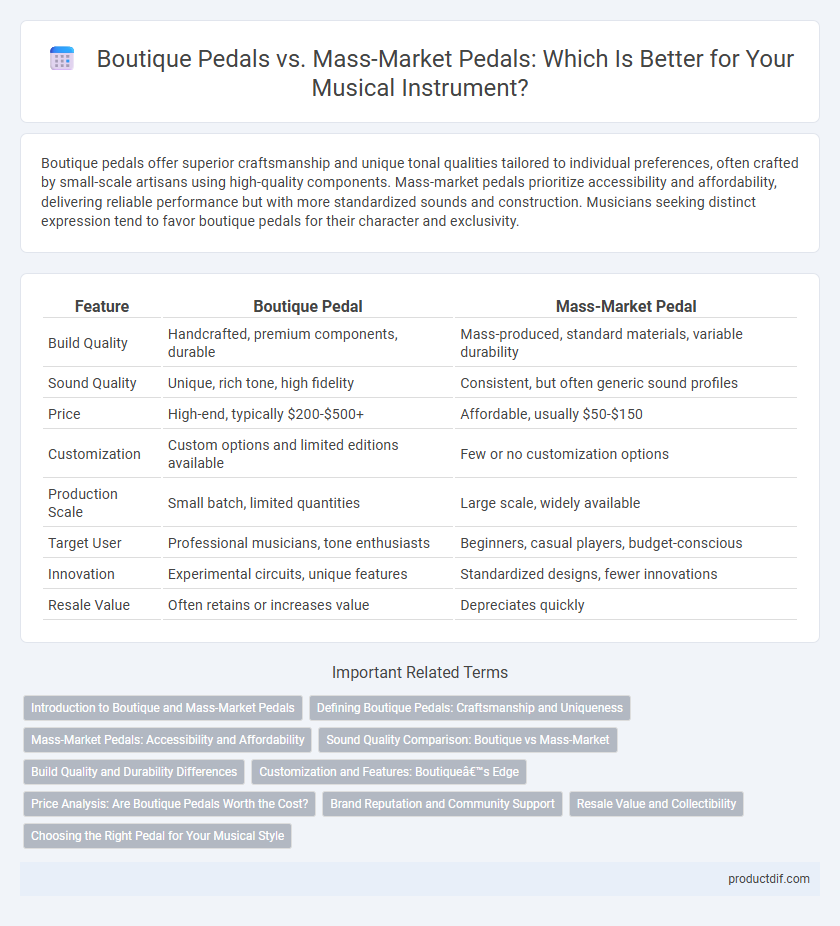Boutique pedals offer superior craftsmanship and unique tonal qualities tailored to individual preferences, often crafted by small-scale artisans using high-quality components. Mass-market pedals prioritize accessibility and affordability, delivering reliable performance but with more standardized sounds and construction. Musicians seeking distinct expression tend to favor boutique pedals for their character and exclusivity.
Table of Comparison
| Feature | Boutique Pedal | Mass-Market Pedal |
|---|---|---|
| Build Quality | Handcrafted, premium components, durable | Mass-produced, standard materials, variable durability |
| Sound Quality | Unique, rich tone, high fidelity | Consistent, but often generic sound profiles |
| Price | High-end, typically $200-$500+ | Affordable, usually $50-$150 |
| Customization | Custom options and limited editions available | Few or no customization options |
| Production Scale | Small batch, limited quantities | Large scale, widely available |
| Target User | Professional musicians, tone enthusiasts | Beginners, casual players, budget-conscious |
| Innovation | Experimental circuits, unique features | Standardized designs, fewer innovations |
| Resale Value | Often retains or increases value | Depreciates quickly |
Introduction to Boutique and Mass-Market Pedals
Boutique pedals are handcrafted with high-quality components, offering unique tonal characteristics tailored for discerning musicians seeking distinct sound and build precision. Mass-market pedals prioritize affordability and broad accessibility, typically produced using standardized components and automated processes to meet the demands of a larger consumer base. The key differences lie in craftsmanship, component quality, and customization options, which influence the pedal's sound, durability, and price point.
Defining Boutique Pedals: Craftsmanship and Uniqueness
Boutique pedals are distinguished by meticulous craftsmanship and limited production runs, often handcrafted by skilled artisans using premium components to achieve unique tonal qualities. These pedals emphasize innovation and individuality, offering distinctive sound textures that mass-market pedals, produced on an industrial scale, typically lack. The focus on quality over quantity ensures each boutique pedal delivers exceptional performance tailored to discerning musicians and collectors.
Mass-Market Pedals: Accessibility and Affordability
Mass-market pedals dominate the musical instrument market by offering broad accessibility and affordability, making them ideal for beginners and hobbyists. These pedals are produced in large quantities, leveraging economies of scale to reduce costs without compromising essential sound quality and functionality. Popular brands like Boss, Zoom, and TC Electronic ensure reliable performance and a wide range of effects at competitive prices, catering to diverse musical styles and budgets.
Sound Quality Comparison: Boutique vs Mass-Market
Boutique pedals typically deliver superior sound quality due to handcrafted components and meticulous attention to tone, offering rich harmonics and dynamic response unmatched by mass-market options. Mass-market pedals often use standardized, lower-cost parts, resulting in more compressed, less nuanced sound output. Musicians seeking unique, expressive tonal characteristics often prefer boutique pedals for their authentic and superior audio fidelity.
Build Quality and Durability Differences
Boutique pedals often feature hand-wired circuits and high-quality components, resulting in superior build quality and enhanced durability compared to mass-market pedals. These pedals typically use robust, premium materials that withstand extensive use and environmental stress better than the materials found in mass-produced counterparts. Musicians seeking long-lasting, reliable gear frequently prefer boutique pedals for their meticulous craftsmanship and resilience.
Customization and Features: Boutique’s Edge
Boutique pedals offer extensive customization options, including hand-wired circuits, rare components, and unique tonal characteristics that cater to individual player preferences. These pedals often feature innovative effects and build quality that surpass mass-market counterparts, providing superior sound clarity and responsiveness. Mass-market pedals prioritize affordability and accessibility, often limiting customization and advanced features to meet broad consumer demands.
Price Analysis: Are Boutique Pedals Worth the Cost?
Boutique pedals typically feature handcrafted components and limited production runs, resulting in higher prices often ranging from $200 to $500 or more, compared to mass-market pedals priced between $50 and $150. The premium cost of boutique pedals reflects superior build quality, unique tonal characteristics, and enhanced durability, appealing to professional musicians seeking distinct sound signatures. Price analysis indicates that while mass-market pedals offer affordability and accessibility, boutique pedals justify their cost through craftsmanship and sonic excellence valued by discerning players.
Brand Reputation and Community Support
Boutique pedals often come from brands with strong reputations for craftsmanship, innovation, and unique tonal qualities, attracting dedicated communities of musicians who share gear tips and personalized modifications. Mass-market pedals are produced by widely recognized brands that prioritize affordability and accessibility, supported by large online forums and widespread retailer presence. Brand reputation in boutique pedals drives a loyal, niche following, while mass-market pedals benefit from extensive community support through broad user bases and consistent customer service.
Resale Value and Collectibility
Boutique pedals often retain higher resale value due to limited production runs and hand-crafted components that appeal to collectors and enthusiasts. Mass-market pedals typically experience greater depreciation as they are widely available and produced in large quantities, making them less rare and less sought-after over time. Collectibility hinges on unique features, brand reputation, and historical significance, domains where boutique pedals frequently outperform mass-produced counterparts.
Choosing the Right Pedal for Your Musical Style
Boutique pedals often feature hand-crafted components, unique circuit designs, and limited production runs that deliver distinctive tonal characteristics tailored to specialized musical styles. Mass-market pedals prioritize affordability and accessibility, providing reliable effects with standardized sounds suitable for a wide range of genres and players. Evaluating your musical style and desired sound nuances helps determine whether a boutique pedal's exclusivity or a mass-market pedal's versatility better suits your creative needs.
Boutique pedal vs Mass-market pedal Infographic

 productdif.com
productdif.com